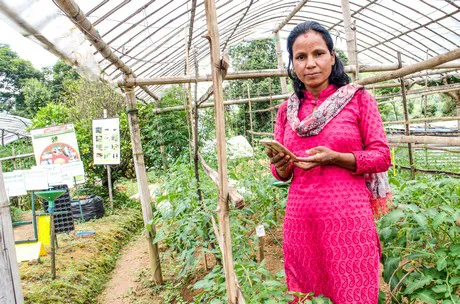Farmers are warding off crop pests and diseases – and merchants are seeing a 100 percent increase in sales of natural products to combat them – since Virginia Tech implemented a text-messaging system in Nepal.

Up-to-date pest and disease information to grow a healthy harvest could mean feeding an entire family for a year, but many smallholder farmers live in remote areas with limited Internet access, which restricts information sharing.
The Feed the Future Innovation Lab for Integrated Pest Management has partnered with iDE in Nepal to develop centers that, in addition to providing commercial market access, link 160 farmers to crop experts through text messaging services. When pest or disease prevalence is high, farmers received vetted identification details and safe integrated pest management (IPM), or ecological, solutions to the crop problems.
The text messages include the contacts of local suppliers who sell IPM products, such as natural fertilizers. Since 2017, with demand of such solutions growing, the local businesses have seen a 106 percent increase in sales. More important, farmers are reporting impacts to their crops, such as relief from the tomato leaf miner, a pest that devastates 85 percent of tomato yields.
“In all of our projects, we want to see improved capacity and ability at all levels, from farmers to their families to private businesses,” said Amer Fayad, associate director of the Innovation Lab. “One of the biggest battles we face is delivery of information, and this system of text messages helps eliminate that problem.”
The messages also contain contact numbers of community business facilitators – entrepreneurial local farmers with training in IPM solutions. These facilitators give support to farmers with questions about crop management and receive a commission from companies on the sale of IPM products. They have seen an 80 percent increase in contact from farmers and a 44 percent increase in income.
“These text messages are helpful because they don’t require Internet access and they are in the local language,” said Lalit Sah, a project collaborator from iDE in Nepal. “Most families do, in fact, have access to at least one phone and also want to take information from people in the community who they trust.”
Elsewhere in Innovation Lab projects, farming communities in Vietnam and East Africa are also improving crop information sharing through the free smartphone app WhatsApp, which supports international text, image, and video capabilities. In Ethiopia, Tanzania, and Kenya, up to 66 farmers and Extension agents exchange WhatsApp messages at a rate of about 52 messages per month.
“Participants ask specific questions about plant problems, and within minutes another participant has provided some feedback, regardless of distance or geography,” said Luis Cañas, associate professor at The Ohio State University and head of the East Africa project. “This network has been very successful and now is being used to link smaller networks that connect directly to farmers in their local language. We expect this could create a new way to distribute knowledge and initiate collaborations in areas where computers are not very common.”
In Vietnam, farmers and Innovation Lab collaborators from the Southern Horticultural Research Institute belong to a WhatsApp group designed for addressing issues on dragon fruit, the country’s major fruit export, but also use the space to exchange information on new IPM products, upcoming farmer trainings and updated market data.
The Feed the Future Innovation Lab for Integrated Pest Management is funded by the U.S. Agency for International Development and housed at the Center for International Research, Education, and Development, part of Outreach and International Affairs.
